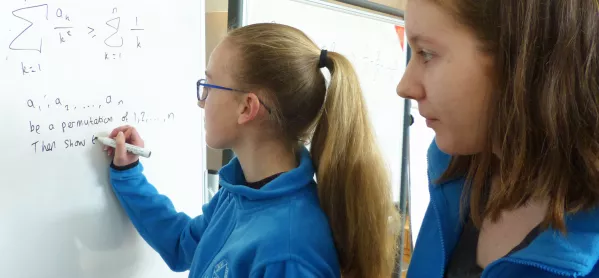Secondary school pupils in the most disadvantaged schools are being hit hardest by maths teacher shortages in England, according to research.
Students across all year groups in those schools are much more likely to be taught by an inexperienced teacher, the Nuffield Foundation found.
Its report said post-16 maths students in the most disadvantaged schools are almost twice as likely to have an inexperienced teacher as those in the least disadvantaged schools – 9.5 per cent versus 5.3 per cent.
The foundation said there was a shortage of maths teachers in England because 40 per cent of teachers leave during their first six years in the profession, while there is an increasing demand for teachers due to moves to increase participation in maths for 16- to 18-year-olds. Teaching is also competing against higher private sector wages for maths graduates.
It commissioned researchers from FFT Education Datalab to examine how secondary schools have responded to this shortage of maths teachers, and the impact it has on students.
Using data from England's School Workforce Census, researchers found that schools were deploying their most experienced and well-qualified maths teachers for year groups where the external stakes are high: GCSE, A-level and GCSE retakes.
This is partly because, in addition to low retention rates, only 44 per cent of practising maths teachers have a degree in maths. In contrast, 65 per cent of English teachers have an English degree.
This means teachers who are inexperienced or do not have a degree in maths are much more likely to be allocated to key stage 3 than key stages 4 and 5, particularly in schools with higher proportions of disadvantaged pupils.
The foundation said 19 per cent of KS3 maths teachers are inexperienced, compared with 7 per cent of KS5 maths teachers.
'Critical shortage of maths teachers'
This carries a risk of switching pupils off maths, at an age when they are forming attitudes to subjects and future choices, the foundation said.
Josh Hillman, director of education at the Nuffield Foundation, said: "This research shows that many schools are struggling to allocate specialist or experienced maths teachers to younger pupils, particularly in disadvantaged areas, which could have an adverse effect on their progression in the subject and their attitudes to it.
"This is a systemic problem and not one that can be solved by individual schools where they are trying to increase the amount of maths teaching in a time of a critical shortage of maths teachers.
"The Nuffield Foundation welcomes new financial incentives to both schools and trainee teachers, but the government should also consider other aspects of teacher recruitment and retention, such as workload, working hours and the lack of options for flexible and part-time working."
Sam Sims, research fellow at FFT Education Datalab, said: "Ofsted have questioned whether the first half of secondary school are 'wasted years' for pupils.
"Our research shows that teacher shortages mean schools are increasingly saving their experienced, appropriately qualified maths teachers for the crucial GCSE years.
"This leaves pupils in Year 7, 8 and 9 to be taught by whoever is left. The problem is particularly stark in disadvantaged areas."
Paul Whiteman, general secretary of the NAHT heads' union, said: “The recruitment crisis continues unabated. The government is still failing to provide enough teachers for our growing school population.
"The recruitment pipeline is leaking at both ends, with insufficient numbers of newly qualified teachers coming into the system and too many experienced teachers leaving prematurely.”




